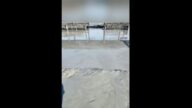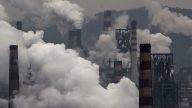【新唐人2012年12月06日訊】長期關注中國環境保護的兩名中國農民,日前,選擇在《紐約時報》刊登廣告,他們除了恭賀剛剛上任的中共七名最高領導人,並且提醒他們,在環境保護方面必須做到「言行一致」。
11月30號,《紐約時報》A疊第24版新聞版,刊登了中國環保志願者陳法慶和吳立紅兩人提出的中、英文環保公益廣告。他們在廣告詞中祝賀七名中共中央政治局常委走馬上任,並希望新的中共最高領導人要重視環境保護方面的工作。
在此之前,陳法慶和吳立紅兩人湊了超過十萬元人民幣的廣告費,想在中共喉舌《人民日報》刊登這則廣告。但《人民日報》廣告負責人告訴陳法慶,這是政治廣告,太敏感,不敢登。
陳法慶接受《新唐人》採訪時表示,由於幾十年來,中國的環境狀況惡化,導致群體事件增多。上個月,中共十八大閉幕,當局把生態建設寫入《中國共產黨黨章》,但是,陳法慶和吳立紅還是希望中共中央領導,在保護環境方面能夠講到做到。
中國環保志願者 陳法慶:「我和吳立紅先生都認識到,我們現在這個環境的狀況是非常糟糕,總的…政府在治理環境方面它是講的多做的少,其實它沒有監管好我們的生存環境,沒有治理好。我們現在做這個廣告,就是希望中國新的領導人保護環境方面,確實給我們這13億的國人,有一個真正的美好家園。這就是我們做廣告的本意。」
45歲的陳法慶是浙江省杭州市餘杭區人,他自1996年開始關注環境保護,至今已經16年,曾經因為當地礦群的粉塵和噪音污染,以及水源保護區污染,而將浙江省杭州市餘杭區環保局、 浙江省政府、和省環保局告上法庭;而44歲的吳立紅,是江蘇宜興人,他自1998年開始關注太湖的水資源保護。吳立紅和妻子許潔華因舉報太湖周邊的化工企業排放廢水,先後失去工作,並且坐冤獄3年,在監獄裡遭到「酷刑折磨」。
陳法慶指出,中國的環境污染,包括水污染、土壤污染、空氣污染,還有溫室氣體的排放,仍然嚴重。
近年來,隨著化工產業的發展,大陸很多地方出現了重金屬污染。從陝西鳳翔鉛污染、湖南瀏陽鎘中毒、山東臨沂砷污染、雲南曲靖鉻污染,再到柳州的鎘濃度超 標。污染的主要是土壤和飲用水。一份7萬人25年健康記錄的抽樣調查顯示,從1965年到2005年,中國人罹患骨癌、骨痛的病人數呈上升趨勢。
陳法慶:「由於環境的污染,在保護環境方面,我們上到中央政府,下到地方政府,一天到晚的說要保護好我們的環境,治理環境污染,建設良好的生態環境。現實是講的好,環境污染現實當中還是…確實這個污染並未好轉。而且有些地方還有惡化的趨勢。」
今年6月,四川省甚邡市民眾因當地化工廠興建「鉬銅項目」,而引發大規模群體抗議事件;接下來的10月下旬,浙江省寧波市鎮海區居民,也因為抗議中石化PX(對二甲苯)污染項目落戶當地,集體到區政府示威。
陳法慶和吳立紅兩人,在關注中國環境保護的十幾年過程中,親身體會到:「中國環保法律、法規的欠缺,是環境污染的根源。」
據報導,之前,陳法慶已利用自己經營建築石料小生意賺來的錢,拿出近百萬元在《人民日報》、《南方週末》、墨西哥《千年報》、英國《經濟學人》雜誌(全球版)、美國《華爾街日報》(全球版)等國內外媒體刊登中、英文公益廣告。
中國環保志願者吳立紅:「我們兩個共同做這個廣告,他也是辛辛苦苦省吃儉用的錢拿出來的,並不是甚麼富翁,很辛苦的。」
可是,目前,他們找不到可以刊登他們廣告的中國傳媒。
採訪/梁欣 編輯/唐睿 後製/黎安安
In China, Environmental Protection Ad is a Political Ad
Two Chinese peasants recently published an
environmental protection ad in the New York Times.
The ad congratulates the new top seven leaders of
the Chinese Communist Party (CCP).
Moreover, it reminds them to “live up to” the
regime’s words in environmental protection.
On Nov. 30, the New York Times published an environmental
protection ad in Chinese and English languages.
The advertisers are Chen Faqing and Wu Lihong,
two Chinese volunteers on environmental protection.
In the ad, they congratulated the election of seven of the
new CCP leaders, and called on them to prioritize environmental protection work.
Chen Faqing and Wu Lihong had originally intended to
publish this ad in the People’s Daily, a mouthpiece of the CCP.
Yet, the newspaper’s Ad Section chief told Chen that
it is classified as a political ad, too sensitive to be published.
Chen Faqing says that over the decades,
China’s environment has deteriorated.
The situation has aroused numerous nationwide mass protests.
At the recent 18th Party Congress, the CCP authorities
integrated building ecological construction into its Party Constitution.
However, both Chen and Wu hoped that the
regime could live up to its words in reality.
Chen Faqing: “Both Mr. Wu and I know that the real
situation is terribly bad.
The government offers only lip services on combating
environmental degradation, but it failed in practice.
We do hope this ad would help voice our wishes that
China’s new leaders would create a pleasant living
environment for us 1.3 billion Chinese people.”
Chen Faqing, 45, is from Hangzhou, Zhejiang Province.
Chen had begun to focus on environmental
protection issues since 1996.
In the past 16 years, Chen Faqing sued local environmental
protection authorities and the provincial authorities for
local mining dust and noise pollution,
and water source pollution.
Wu Lihong, 44, is a citizen in Yixing, Jiangsu Province.
Since 1998, Wu started to get involved in protection of
Lake Tai, a large lake in the Yangtze Delta plain.
Wu and his wife lost their jobs for informing against chemical
plants for their discharge of waste water into Lake Tai.
Wu was even sentenced to three years in jail,
where he underwent several tortures.
Chen Faqing reveals that China is beset by severe pollution
in water, soil, air quality, plus greenhouse gas pollution.
In recent years, the chemical industry’s rapid growth has
created massive heavy metal pollution across China.
The reported cases include lead pollutions in Fengxiang,
Shaanxi; cadmium poisoning in Liuyang, Hunan;
arsenic contamination in Linyi, Shandong;
chromium pollution in Qujing,Yunnan;
and excessive cadmium found in Liuzhou, Guangxi.
In Chian, soil and drinking water pollution stands atop.
A survey with a sample size of 70,000 residents shows
an upward trend of Chinese people suffering from
bone cancer and bone pain, in a period from 1965 to 2005.
Chen Faqing: “All day long, the authorities claim
how well they are protecting our environment,
fighting environmental pollution and building a
pleasant ecological environment. That’s good talking,
but in reality, pollution still remains unchecked
in our daily life, and has even worsened in some areas.”
In June, a large-scale mass protest occurred
in Shifang, Sichuan Province.
The residents opposed the local authorities to build
a molybdenum copper plant.
In October, Ningbo citizens demonstrated in front of
city hall, protesting against a local paraxylene (PX) project.
Involved in envionmental protection for over a decade,
both Chen Faqing and Wu Lihong have discerned a fact.
That is, “Lack of environmental laws and regulations is
the root cause of environmental pollution in China."
Over the years, Chen Faqing has reportedly taken out nearly
1 million Yen, earned from his building materials business,
to publish environmental protection ads.
The public service ads were displayed in the People’s Daily,
the Southern Weekend, Mexican newspaper Milenio,
UK’s Economist, and in the Wall Street Journal, etc.
Wu Lihong: “He saves money from his life expenses to
publish this ad. He’s not a rich man but has lived very frugally.”
So far in China, Chen and Wu haven’t yet found media
that can publish their public service ad.


























